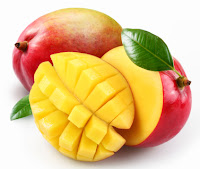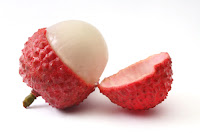Recently, the book- The Ultimate Illustrated Guide to DSS attracted me with the section 'Flora and Fauna' under the fruit subject..overall, it's all about symbolic conceptualization that been used by human since prehistoric days. I bought this book 3 years ago, which was not very expensive (in Ringgit: 39.90) and until now, I'm still flipping the pages- hopefully I can make an end of reading someday. So, I want to shared with you the symbolic conceptualization of fruits- which appeals directly and powerfully to senses.
(Hermes House; 2007; 188-189)
Apple is identified as the 'fruit of knowledge', whether of good and evil, or of life, wisdom and immortality as in the golden apples of the Hesperides.
The Celts: The apple tree is the 'otherworld' tree, the doorway to the fairy world (King Arthur took refuge on the legendary Isle of Avalon, the apple orchard).
China: apple blossom symbolized feminine beauty and the tree means peace.
New York: In early 19th century, Johnny Appleseed pursued his dream of blossoming apple trees where no one went hungry throughout America so the great metropolis New York city now known as the 'Big Apple'.
* Japan: In Death Note, apple is the dead's god favorite fruit.
* South Korea: In G-Dragon's Heartbreaker MV, apples were the symbol of heartbreaking, the evil woman who left him.
*America: Steve Jobb used 'apple' as a symbol of his product, which obviously a success in marketing promotion and holding the symbol of intelligence identity.
Peaches originated from China, it were considered as the holy tree of life, producing the elixir of immortality.
Taoists: Peach blossoms associated with virginity, and 'tao' is the Chinese word for 'peach'.
Early Europe: The peach was called as 'the fruit of Venus' and was sacred to Hymen, Roman god of marriage.
Christianity: a peach in the hand of the infant symbolizes salvation.
* Modern America: 'peachy' or 'peaches' sometimes been used to describe the great satisfaction or wonderful feeling toward something.
A cherry colour in the lips of a Chinese woman is considered as a quality of great beauty and eating cherries become the phrase of sexual intercourse.
Western: The cherry is associated with Hymen, and the losing cherries become the phrase of losing the virginity.
Japan: Cherry blossom is the national flower for Japanese and samurai, paralleling to the Samurai's willingness to face death in his prime.

Dates originated near the Persian Gulf, grown prolifically in Iraq.
Egyptian: The fruit was the fertility symbol, the date palm is referred to as the king of oasis by the Arabs.
Islam: Dates were the favorite fruit of the Prophet Muhammad S.A.W.
Plums in the Far East is common symbol of the spring, also the end of winter. It blossoms as the threshold between two seasons: representing the renewal and youthfulness.
Japanese and Christianity: Both religions used plums as part of the tradition, to symbolized the fidelity.
The orange tree's Latin name, Fructus Aurantia refers to the golden colour of the orange.
Spanish: the orange fruit 'naranja' comes from the Persian 'narang' means 'interior perfume'.
Christianity: an orange in the hand of the infant Christ represents fertility and good fortune.
Europe witches: It represents the heart.
China: Still eaten as the symbol of good fortune on the second day of the New Year.
Judaism: In modern Judaism, an orange placed on a seder plate came to symbolize the leadership of Jewish women.
Mangoes are native to eastern India and Burma.
India: Considered as the sacred, representing fertility and good fortune.
Buddhism: Legend has it that the Buddha was given a mango grove in which he could seek to repose.
Apricots were the symbol of woman's beauty in China, and also the symbol of sexuality. Red apricots symbolize a married woman who has taken a lover and often compared that the stone of apricot is like the eyes of the beautiful woman.
Banana botanical name, Musa Sapientum means 'the fruit of the wise men', was given by a Swedish botanist named Linnaeus who heard Alexander the Great encountered the sage in India who lived entirely on bananas.
Islam: According to Quran and Islamic stories, bananas are the forbidden fruit in paradise.
Buddhism: Banana is the symbol of transient nature, weakness of matter and mental construction.
Hinduism: The symbol of fertility and prosperity due to its tendency to fruit regularly.
Lychee is the small fruit from Southern China, believed by married couple as the best way to express the desire to have children by placing lychees under the bed.
Grapes and vines often appear in Roman art, suggesting wealth and pleasure and associated with Baachus the Roman equivalent of the Greek Dionysus, god of the vine, sexuality, fertility and liberation of passion and expression (huh~ what a long name).
Israelites: Grapes represented the possibility of new life.
Christianity: Grape wine is the symbol of the blood of Christ, and associated with Christ himself on how Christ changed the plain water into a delicious wine with his miracle.
Pomegranates were growing in Mediterranean climates, glistening inside with the juicy red, jewel-like seed. Their name means 'the apple of many seeds'.
Islam: It was one of the gifts of Allah s.w.t in the Quran.
Israelites: It represented the charm of their land and the wisdom of its people.
Egyptian: Pomegranates were left as a food in Egyptian tombs to accompany the dead on their journey.
Greece: A pomegranate is broken on the floor as a symbol of fertility and abundance.
Christianity: A symbol of hope in Christian art.
The fig tree and its many-seeded fruit are the symbol of plenty and fertility, often associated with feminine qualities.
Rome: Romans considered figs lucky or unlucky according to whether they were light or dark.
Christianity: In the Book of Genesis, Adam and Eve used fig leaves to cover themselves when they were naked and shamefully aware with their nakedness.
Africa: Kotoko people of Chad connect the fig with childbearing.
MaGi2012
p/s: please correct me if I've been mistaken about the connection between fruits and religions. TQ ^^










.jpg)

please g+1 once you read this...^^
ReplyDelete